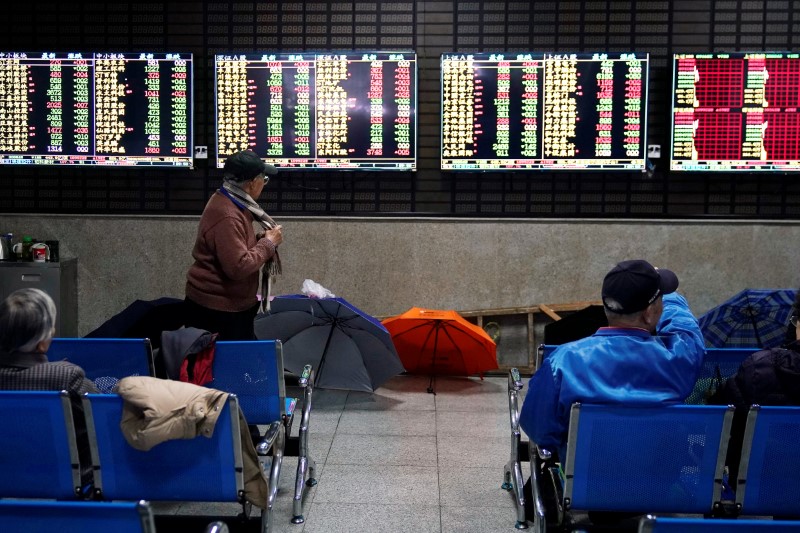By Wayne Cole
SYDNEY (Reuters) - Asian shares held near a 20-month top on Monday even as investors took some money off the table following a strong run recently, while oil jumped to more than a one-week high after two large crude production bases in Libya began shutting down.
In early European trades, the pan-region Euro Stoxx 50 futures (STXEc1), German DAX futures (FDXc1) and FTSE futures (FFIc1) each added 0.1% while E-Mini futures for the S&P 500 (ESc1) inched up slightly.
Turnover in Asian shares was light with U.S. stock and bond markets closed for the Martin Luther King Jr. holiday.
MSCI's broadest index of Asia-Pacific shares outside Japan (MIAPJ0000PUS) gave up early gains to be flat, after earlier notching up its highest since June 2018. Japan's Nikkei (N225) added 0.2% to be near its highest in 15 months.
Chinese shares stayed strong with the blue-chip CSI300 index (CSI300) rising 0.7%.
Australia's main index (AXJO) scored another all-time peak and South Korea (KS11) was near its best level since October 2018.
Eyes will be on U.S. corporate earnings with Netflix Inc (O:NFLX), Intel Corp (O:INTC) and Texas Instruments Inc (O:TXN) set to report this week, while central banks in the European Union, Canada and Japan hold policy meetings.
Sentiment was supported by the relentless run of record highs on Wall Street. Only three weeks into the new year, the S&P 500 (SPX) has gained just over 3% and the NASDAQ (IXIC) almost 5%.
Ray Attrill, head of foreign exchange strategy at National Australia Bank, suspects the strength on Wall Street owes much to the Federal Reserve's decision in September to rein in rising repo rates by flooding markets with cash.
"The relationship between the size of the Fed's balance sheet, now some 11% bigger than where it was in late September, and the performance of U.S. risk assets is uncanny," he said, noting the balance sheet had just hit a three-month top of $4.18 trillion.
Analysts at BofA Global Research noted global stock market capitalisation had ballooned by $13 trillion since its September lows and the S&P was only 5% away from marking the biggest bull run in history.
"We stay irrationally bullish until peak positioning and peak liquidity incite a spike in bond yields and a 4-8% equity correction," they said in a note.
The Fed's buying binge on Treasury bills has kept bonds bid even as stocks surged and economic data stayed healthy. Yields on two-year notes (US2YT=RR) are dead in line with the overnight cash rate at 1.56%, compared to 2.62% this time last year.
The string of mostly solid U.S. data has underpinned the dollar, particularly against the safe-harbour yen. The dollar stood at 110.17 yen on Monday, having hit an eight-month peak of 110.28 last week.
The euro was stuck at $1.1097 (EUR=), while sterling idled at $1.3000 after poor British economic news fanned speculation about a cut in interest rates.
Against a basket of currencies, the dollar was flat at 97.616 (DXY), moving away from the recent trough of 96.355.
Spot gold was a tad firmer at $1,561.69 per ounce , having hit a seven-year top earlier this month of $1,610.90 at the height of Iran-U.S. tensions.
Concerns about a cut in supply sent oil prices higher as oilfields in southwest Libya began shutting down after forces loyal to Khalifa Haftar closed a pipeline.
[O/R]

Brent crude (LCOc1) futures rose 79 cents to $65.64 a barrel, while U.S. crude (CLc1) jumped 61 cents to $59.15.